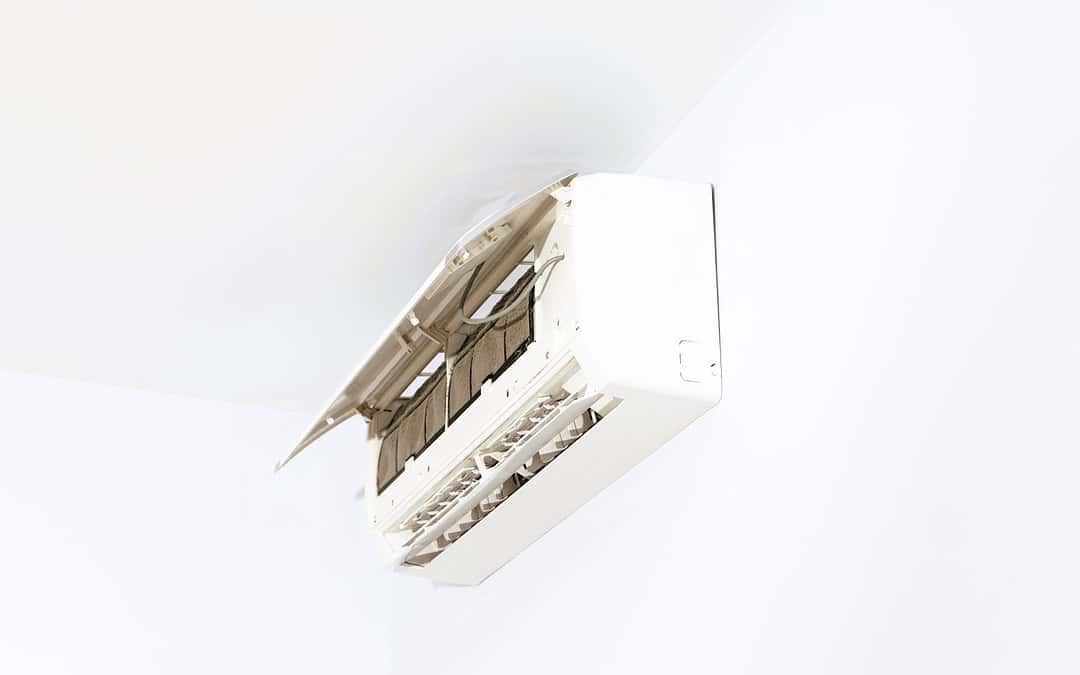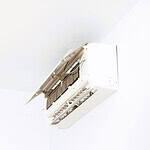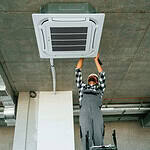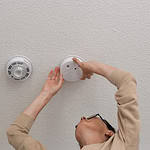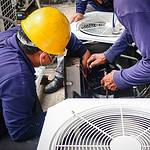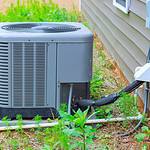Preventing mold growth in your mini-split system is crucial for maintaining a healthy indoor environment. Mold thrives in damp, dark places, and mini-split systems can provide the perfect conditions if not properly maintained. Ignoring mold issues in these systems can lead to serious health risks and expensive repairs. By following some simple maintenance practices and being aware of potential problems, you can keep your mini-split system mold-free and functioning efficiently.
What Causes Mold in Mini-Split AC
Mold in mini-split systems is often caused by a combination of moisture, warmth, and lack of airflow. These systems, while efficient, can accumulate condensation, especially if the unit isn’t cleaned regularly. Over time, this moisture can become a breeding ground for mold. The indoor units of mini-split systems are especially vulnerable because they are typically located in areas with higher humidity, like bedrooms, basements, or living rooms.
Experienced HVAC technicians often encounter mini-split systems with mold issues that could have been prevented with regular cleaning and maintenance. One common scenario is when homeowners neglect to clean the filters, allowing dust and dirt to accumulate, which in turn traps moisture and leads to mold growth. A few steps can help avoid this problem:
- Keep the filters clean by washing them every two weeks during peak usage.
- Ensure that the indoor unit is properly ventilated and not obstructed by furniture or curtains.
- Use a dehumidifier in rooms with higher humidity levels.
Health Risks of Mold in AC Units
Mold growing in your mini-split system isn’t just an eyesore—it poses significant health risks. Mold spores can circulate through the air, potentially causing respiratory issues, allergies, and other health problems, particularly for individuals with asthma or weakened immune systems. The World Health Organization reports that indoor air pollution, including mold, is a leading cause of respiratory diseases globally.
A mold-infested AC unit can exacerbate these issues by continuously circulating contaminated air throughout your home. Some signs that mold might be affecting your health include frequent headaches, dizziness, and unexplained fatigue. Taking the health risks seriously is essential, as mold can have long-term effects on your well-being. Key preventive actions include:
- Schedule regular professional inspections to catch mold before it spreads.
- Replace filters as recommended by the manufacturer to keep the air clean.
- Monitor indoor humidity levels to keep them below 60%.
How to Clean Mini-Split Filters Regularly
Cleaning the filters of your mini-split system is one of the easiest ways to prevent mold growth. Dirty filters not only reduce the efficiency of your AC but also create a breeding ground for mold. Regular filter maintenance ensures that your system runs smoothly and that the air circulating in your home is clean.
Many people forget this simple yet crucial task, leading to reduced airflow and increased moisture in the system. Cleaning the filters is straightforward and can be done without professional help:
- Remove the filters from the indoor unit according to the manufacturer’s instructions.
- Wash the filters with warm water and mild detergent, then allow them to air dry completely before reinserting.
- Set a reminder to clean the filters every two weeks during high-use seasons.
Professional AC Repair for Mold Prevention
Sometimes, preventing mold in your mini-split system requires more than just regular cleaning—it calls for professional AC repair. Technicians can inspect your system for mold, clean hard-to-reach areas, and ensure that everything is functioning correctly. Professionals have the tools and expertise to detect early signs of mold and can address underlying issues that might be contributing to moisture buildup.
When mold issues arise, they are often more complex than a simple cleaning can resolve. Leaks in the system, improper installation, or a malfunctioning drain can all contribute to mold growth. It’s crucial to rely on an experienced technician who understands these systems well:
- Schedule an annual inspection to keep your system in peak condition.
- Address any strange odors or visible mold immediately with professional help.
- Consider investing in a maintenance plan that includes regular cleaning and inspections.
How to Reduce Humidity in Your Home
Controlling indoor humidity is one of the most effective ways to prevent mold in your mini-split system. High humidity levels can cause excess moisture in the air, which leads to condensation on your AC unit, creating the perfect environment for mold. The Environmental Protection Agency (EPA) recommends keeping indoor humidity between 30% and 50% to avoid mold growth.
Several strategies can help maintain optimal humidity levels:
- Use a dehumidifier in areas prone to high humidity, such as basements or bathrooms.
- Ensure your home is well-ventilated, especially when cooking or showering, by using exhaust fans.
- Seal any leaks around windows or doors to prevent excess moisture from entering your home.
Benefits of UV Lights in Mini-Split Systems
UV lights are an innovative solution to prevent mold growth in mini-split systems. Installing UV lights inside your AC unit can effectively kill mold spores and bacteria, keeping the system clean and the air in your home healthy. UV lights work by breaking down the DNA of microorganisms, rendering them harmless and preventing them from multiplying.
Many homeowners are now opting to add UV lights to their AC systems as a proactive measure against mold:
- UV lights can be installed directly in the indoor unit of the mini-split system.
- They require minimal maintenance and have a long lifespan.
- UV lights can significantly improve indoor air quality by eliminating harmful pathogens.
How to Detect Mold in AC Units
Detecting mold in your mini-split system early is key to preventing serious health issues and expensive repairs. Mold can be tricky to spot, especially inside an AC unit, but there are several warning signs to watch for. A musty odor coming from your AC is often the first clue that mold may be present. You might also notice visible spots of mold on the unit or experience allergy-like symptoms when the AC is running.
Routine inspections and awareness can help you catch mold before it becomes a bigger problem:
- Regularly check the indoor unit for visible signs of mold or moisture.
- Pay attention to unusual smells when the system is operating.
- If you experience unexplained health issues, consider having your system inspected for mold.
What to Do if Mold Is in Your AC
If you discover mold in your mini-split system, acting quickly to prevent it from spreading is crucial. Mold removal can be a complex process, especially inside an AC unit, where spores can easily be dispersed throughout your home. In most cases, it’s best to leave mold removal to professionals who have the right equipment and expertise to handle the job safely.
Taking immediate steps can mitigate the impact and restore your system to proper working order:
- Turn off the AC unit to prevent further circulation of mold spores.
- Contact a professional HVAC technician to assess the situation and perform a thorough cleaning.
- Consider installing UV lights or additional filtration to prevent future mold growth.
Key Takeaways: Preventing Mold Growth in Your Mini-Split System
Maintaining a mold-free mini-split system is essential for healthy indoor air quality and the longevity of your AC unit. Regular maintenance, including cleaning filters and controlling humidity, can go a long way in preventing mold. Professional inspections and the use of UV lights provide additional protection, ensuring that your system remains clean and efficient.
- Regularly clean filters to prevent moisture buildup.
- Control indoor humidity to reduce the risk of mold.
- Rely on professional AC repair services for thorough inspections and mold prevention.
Frequently Asked Questions
- How often should I clean the filters in my mini-split system?
- Clean the filters every two weeks during periods of high usage to prevent dust buildup and mold growth.
- Can mold in my AC make me sick?
- Yes, mold spores can cause respiratory issues, allergies, and other health problems, especially in individuals with asthma or weakened immune systems.
- What is the best way to reduce humidity in my home?
- Use a dehumidifier, ensure proper ventilation, and seal any leaks around windows or doors to maintain optimal humidity levels.
- Are UV lights effective in preventing mold in mini-split systems?
- UV lights are highly effective at killing mold spores and bacteria, preventing them from multiplying inside your AC unit.
- When should I call a professional for mold issues in my AC?
- If you notice mold or a musty odor, or experience health symptoms, contact a professional immediately to assess and clean your system.
- About the Author
- Latest Posts
Founded in 2006, Daigle A/C & Heating has grown from a small startup to a multi-state operation through dedication to detail and quality workmanship. Specializing in air conditioning and heating solutions, the company not only serves residential and commercial clients but also holds contracts with various U.S. Government outlets.

